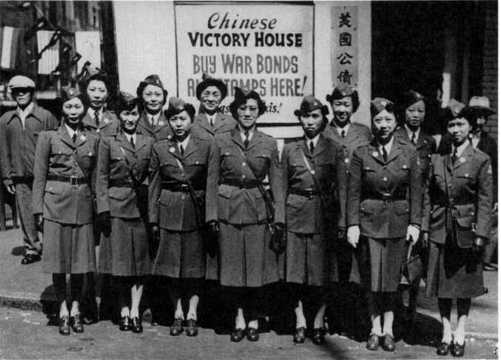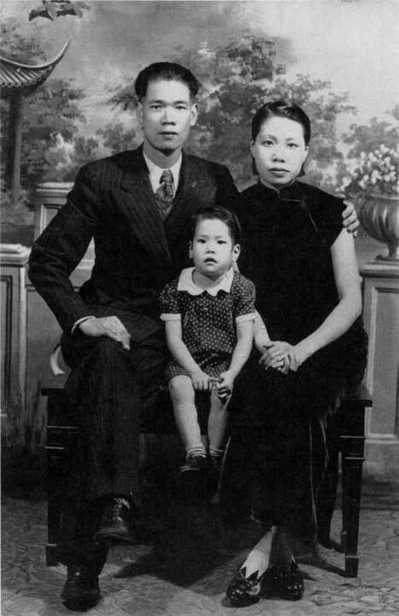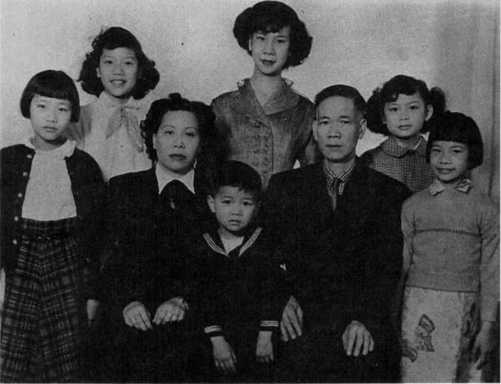Unbound Feet: A Social History of Chinese Women in San Francisco (52 page)
Read Unbound Feet: A Social History of Chinese Women in San Francisco Online
Authors: Judy Yung
The AWVS led Chinese women in the area of fund-raising for the
Allied war effort. Having already contributed over $3 million for war
relief in China since 1937, San Francisco Chinatown joined with the
rest of the country to fill the American war chest. Asked to raise
$io,ooo for the Red Cross in 194z, the Chinese raised $i8,ooo-on
top of $30,000 for defense bonds and $50,000 for the Chinese war relief fund that same year.171 In each of the eight national war bond cam paigns, too, the Chinese community consistently raised large amounts
of money-$750,000 worth in the seventh campaign alone, for exam-
ple.172 Separate women's divisions brought in the largest sums in all these
various drives. Money also poured in from the AWVS war bond booth
in Chinatown, which, though set up at the suggestion of the Chinese
Six Companies, was staffed by women volunteers. Martha Taam, one of
the volunteers, recalled: "We all dressed up in our gray uniforms and
took a four-hour shift selling war bonds at this booth on Washington
and Grant Avenue. It was quite successful. Stores would buy bonds, and
many Chinese too. "173 Each day an average of $ i,ooo was collected from
war bond sales alone. In addition, the AWVS chapter sponsored benefits that featured Chinese American radio and nightclub stars as well as
auctions and raffles; at one such benefit, $6o,ooo was raised.174

Martha Taam (front row; far left) and the Chinese chapter of the American
Women's Volunteer Services selling war bonds in Chinatown. (Courtesy of
Martha Taam)
Reflecting a united front in the merging of two war efforts, Chinatown was invited to participate in the city's Pearl Harbor anniversary parade in 1942 and the "I Am an American Day" program held at the Civic Auditorium in 1943. Then in 1944, the Chinese community
changed the annual Double Seven parade (in commemoration of 7-7,
the day Japan invaded China) to the Triple Seven parade, to mark the
seventh year of the War of Resistance. A special open house party was
held in Chinatown and at the Civic Center to express appreciation of
American support for the war in China. Chinese American women were
in the forefront in all of these events. It was in large part because of their
efforts that close to $13,000 was raised at the Triple Seven open house
in 1944, with another $ 5 z,ooo being collected for Chinatown's victory
celebration in 1945. 175
On August 14, 1945, when Japan's surrender was publicly announced, overjoyed revelers filled the streets of downtown San Francisco and the adjacent financial district. Crowds carried on all night long,
making bonfires of Victory Bond booths, breaking windows, and overturning cars in uncurbed jubilation.176 Margaret Woo, who was working downtown that afternoon, noticed all the people running outside:
"There were mobs of people, and the soldiers were kissing all the girls
on the street," she said. "All the stores closed for the day. Everybody
was so happy, screaming, `The war's over! 111177 Lorena How recalled the
joyous occasion in this way:
It came around 4 P.M. in the afternoon. The siren went off at the Ferry
Building. Normally the siren would go off at 12 noon and again at 4:30,
so we were all very surprised when it went off at 4. Then the siren was
joined by the St. Mary's bells. Then all the other church bells began ringing and chiming. My mother, who always kept up with the news, knew
the war was over when she heard the siren. We all ran out into the street,
got into my brother's car, and started driving around.... We didn't know
that the gas cap was off. People were throwing confetti and firecrackers,
and there was paper all over the streets. It was a wonder we didn't get
blown up.178
A few days later, Chinatown held its own celebration and began preparations for its role in the citywide victory parade. On September 9, the
day of the parade, all Chinatown businesses were closed. Twenty-eight
Chinese units, including veterans, dignitaries, men and women's organizations, Chinese schools, and lion dancers, took part in the four-hourlong parade that marched from the Ferry Building to City Hall.179
For most Americans, World War II lasted four years. For Chinese Americans, it was a protracted war of fourteen long years. Throughout that
period, despite their own socioeconomic problems, they stood steadfast in their commitment to help China and then the United States defeat
their common enemy. Because of the united efforts of all Americans,
victory was finally achieved in 1945. In the wake of that victory, Chinese American women, who had given generously of their time, money,
and energies, found themselves in step not only with the rest of their
community but also with the larger society.

In 1941, the same year that Japan bombed Pearl Harbor,
forcing the United States to enter World War II, my mother, Jew Law
Ying, set sail for America on the S.S. President Coolidge with her fouryear-old daughter, Bak Heong (meaning "forced to leave the home vil-
lage").1 The Chinese Exclusion Act was still in force, so my father, Tom
Yip Jing (a.k.a. Yung Hin Sen), changed his status from laborer to merchant by declaring partnership in a Chinese art goods business. This way,
my mother could come as a merchant's wife. Mother was glad to be leaving war-torn China for what she believed would be "heaven," despite
her maternal grandmother's warnings. She took with her the parting
words of her mother: "Be sure to send for your two younger brothers
as soon as you can." Nothing was said about her three younger sisters.
Although the practice of footbinding had stopped with Great-Grandmother's generation, feudal ideology concerning male preference was
still very much alive in many parts of China.
Mother and Bak Heong, upon arrival in San Francisco, were detained
at the immigration station temporarily located on Silver Avenue (the Angel Island station was destroyed by fire in 1940). Their experience there
was not very different from the ordeal suffered by women on Angel Island. My mother recalled:
All of the women lived in the same large room. I think there were maybe
twenty of us at the time. It was quite spacious. We would chitchat and
talk a lot. Some of us would sew and read. That's about it. Other times
we would become depressed because our future was so uncertain. Many
of us did not know how long we would be detained and if we would set
foot in San Francisco or not. Some of the women burned incense to ward
off the evil spirits. Some were deported back to China. Two of the women
I met there became my friends for life.

My parents, Toni Yip Jing and Jew Law Ying, and my eldest sister Bak Heong
reunited in San Francisco, 1941. (Judy Yung collection)

The Tom/Yung family in 1954. Front row, left to right: Patricia, Jew Law
Ying, Warren, Tom Yip Jing/Yung Hin Sen, Judy (author); back row, left to
right: Sandra, Sharon, and Virginia. (Judy Yung collection)
There were at least two positive changes relative to Angel Island. According to my mother, the Chinese food at the Silver Avenue station
was actually pretty good. For lunch and dinner, they always had soup
and at least three different dishes to go with the rice. My father also sent
her roast duck a number of times, and at the snack bar she was able to
buy other Chinese food such as preserved bean cakes. The women, except for those who had failed the interrogation, were also free to come
and go within the building-unlike at Angel Island, where they were
locked inside their sleeping quarters.
Mother had memorized all the information concerning Dad's "paper son" side of the family with great trepidation, but for her the interrogation proved easier than expected. "They were more interested in
the fact that my mother was an American citizen," she recalled. "They
asked me more questions about my maternal side of the family. The entire interrogation took only half an hour. It was very simple. Everything
was said through an interpreter."2 Mom considered herself one of the lucky ones. "When I left, many of the women there were sad because
they had been there so much longer than I, spending many days crying
and feeling miserable."
Little did my mother know that her miserable days were just about
to begin. She spent the first few years in Menlo Park, California, in a
run-down house on the private estate of the Cowell family, for whom
Dad worked as a gardener. "We had only a wood-burning stove and we
slept in an old broken bed," she said. "Times were very hard then. I could
hardly adjust. I remember crying so much because I was used to a more
comfortable life [living with my grandparents] in Macao. We had servants to do everything [in Macao]. I never had to cook or chop wood
before. Here there was no hot water and I had to wash all the clothes
by hand." From sunrise to sunset, my mother picked suckers off flowers at one of our kinsmen's nurseries close by, making 25 cents an hour.
"I would be paid at the end of the season, if the season was good," she
said. "If it was a bad year, they would just owe me the money until the
next year." When she was about to give birth to their second child, my
father could not get her to the hospital in time because of the war curfew. An old midwife with trembling hands was called in, and Father assisted in the difficult birth. My second sister, Sandra-named See Heong
("thinking of the home village")-was thus born in circumstances far
removed from the sterile hospital in Macao where Bak Heong (later
named Sharon) came into the world.